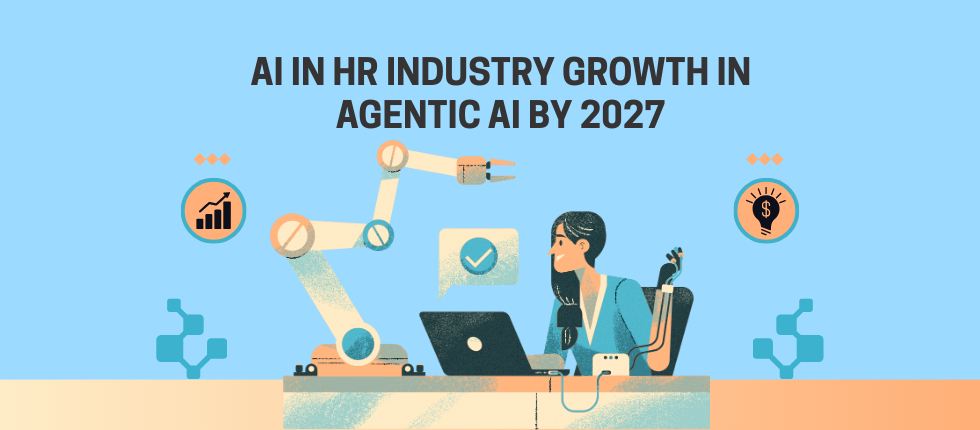AI in HR: Indian HR leaders brace for 383% growth in Agentic AI by 2027
Imagine walking into your office in 2027, and you find AI agents screening job candidates, managing leave requests, analyzing employee engagement, and flagging potential attrition risks. It might sound futuristic, but Indian HR leaders say this future is just around the corner. According to recent research from Salesforce, agentic AI adoption in Indian HR functions is expected to grow by a staggering 383% by 2027. That would take adoption from 12% today to 58% in three years—one of the sharpest upward trends ever seen in the space.
What is agentic AI and why the hype?
Unlike conventional AI tools that rely on human direction, agentic AI works autonomously. Think of it as a virtual HR co-worker that can make decisions, take action, and even adapt over time—without needing constant hand-holding. These AI “agents” can conduct first-round interviews, interpret sentiment in employee feedback, approve leave requests, and even predict when someone might be thinking of leaving—all in real time.
For Indian companies—many of which manage thousands of employees across multiple locations—this technology represents a massive opportunity to streamline operations, reduce overhead, and improve employee experience.
The numbers make a strong case
Indian CHROs estimate that full adoption of agentic AI could lead to a 41.7% boost in employee productivity. Even more impressive is the expected 26.2% drop in labor costs—figures based on real pilots already underway in sectors like IT, banking, and manufacturing.
For a mid-sized organization, this could mean saving millions annually while offering faster, smarter HR support. It’s not hard to see why leaders are making this a priority.
A gap between reality and ambition
Right now, 88% of Indian companies haven’t deployed agentic AI—but most plan to catch up fast. That creates a unique window for early adopters to gain a competitive edge. According to the research, 63% of employees aren’t sure how digital labor will impact their roles. That signals a clear need for education and transparency. It also highlights a challenge to address: how to integrate AI into the workplace without creating confusion or fear.
Many HR professionals are now acknowledging that they might be the last generation to manage an entirely human workforce. And that realization is sparking important conversations about what HR will look like in the years to come.
Reskilling: A people-first approach
Despite the tech-forward outlook, Indian HR leaders are placing strong emphasis on the human side of this transformation. Rather than replacing jobs, 81% of CHROs plan to reskill their workforce—equipping employees with the tools they need to thrive in an AI-augmented environment. This includes not only AI literacy, but also a renewed focus on soft skills: empathy, collaboration, creativity, and critical thinking. These are the areas where humans still shine and where machines will need support.
It’s a shift from “AI vs. humans” to “AI and humans working together.”
Sector-wise adoption: A closer look
Adoption will look different depending on the industry:
- IT & ITeS firms are already using AI agents for resume screening, code reviews, and even project coordination. Unsurprisingly, they are leading the curve.
- Banks and financial services are cautiously exploring AI for compliance checks, risk monitoring, and 24/7 customer support—use cases where precision and speed matter.
- Manufacturing companies are eyeing agentic AI for things like scheduling, safety audits, and supply chain coordination. When operations span shifts, cities, and roles, autonomous systems can save serious time.
Healthcare players are deploying AI to manage shift planning, verify credentials, and automate admin tasks—freeing up HR teams to focus on patient-centric hiring and retention.
What’s standing in the way?
Despite the momentum, implementing agentic AI isn’t plug-and-play.
First, there’s the regulatory maze—India’s data privacy and compliance landscape is evolving, and HR departments must ensure their AI tools are aligned with both local laws and internal policies.
Then comes the challenge of digital literacy. Not every employee is tech-fluent, and rolling out intelligent automation means investing in upskilling and support.
Finally, there’s the often-overlooked change management aspect. Even the smartest tech won’t stick if your people aren’t ready. Leaders need to communicate clearly, build trust, and help teams understand what AI can—and can’t—do.
Urban vs. Rural: How adoption will vary
The 383% growth won’t happen evenly across the country.
Major metros like Mumbai, Delhi-NCR, and Bangalore are expected to lead the charge, thanks to high-tech workforces and greater access to AI talent. But cloud-based platforms and SaaS delivery models are quickly leveling the playing field. Tier-2 and Tier-3 cities are also beginning to tap into agentic AI—especially in industries like retail, logistics, and education.
How to start preparing now
For companies that haven’t started this journey yet, the takeaway is simple: START NOW.
Implementing agentic AI is about building the right foundations. That includes choosing HR platforms that are flexible, cloud-native, and AI-ready.
Beehive HRMS: A platform built for what’s next
At Beehive HRMS, we are building the tools to help Indian organizations bridge today’s HR needs with tomorrow’s possibilities. Our platform supports all core HR functions—payroll, leave, compliance, onboarding—and is architected for seamless integration with emerging technologies.
With advanced analytics, easy customization, and robust compliance features, Beehive HRMS is the foundation Indian businesses need as they prepare for the future of work.
FAQ's
It tracks how people feel, what’s stressing them out, and whether they are engaged—so leaders can take action early and build a healthier workplace.
Nope. Beehive is scalable and flexible, making it a great fit for startups, SMEs, and enterprises alike.
It focuses on productivity and more importantly on emotional well-being with features such as happiness surveys and anonymous support channels.
Yes, it can. It’s designed to enhance what you already have or help you start from scratch.
Better retention, higher productivity, less burnout, and a company culture that doesn’t make people want to flee.


